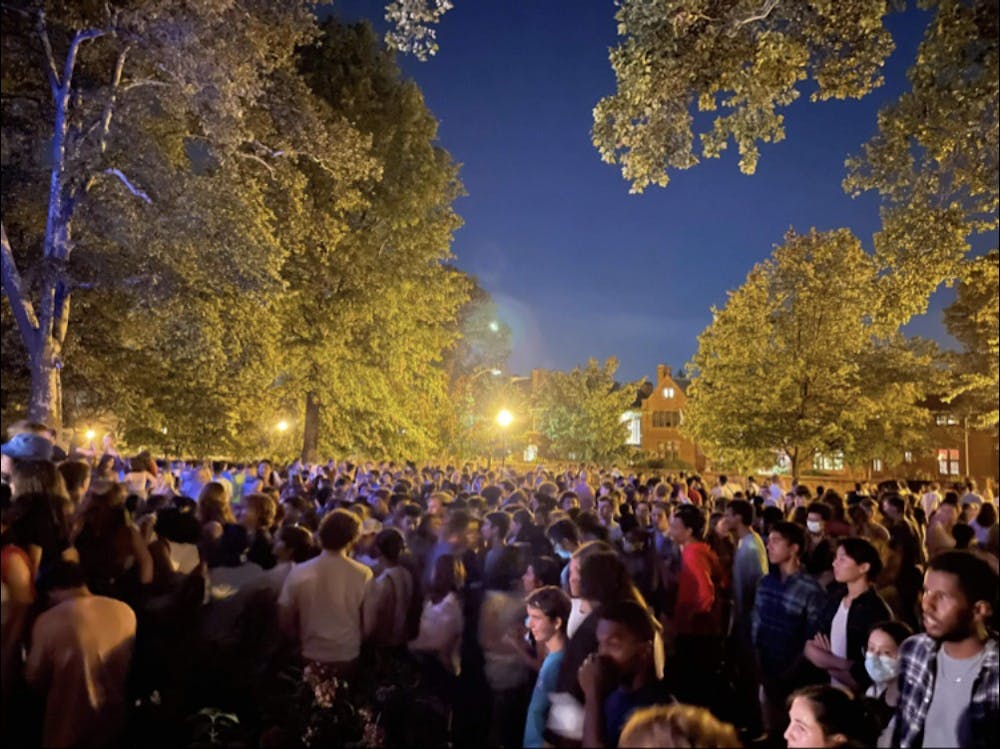Last weekend, the Street reopened to all undergraduates for the first time in 18 months; the return of in-person festivities resulted in long lines and overcrowding.
As of Thursday, Sept. 16, some of the University’s 11 eating clubs have begun reopening to the greater student body.
On Thursday, Terrace Club held the first PUID event of the semester: Open Tap Night, featuring Sam Spector ’24 and the Degenerates. The event was followed the next night by Colonial Club’s Stoplight party.
Clubs waited until Sept. 16 to reopen due to both safety concerns regarding the COVID-19 pandemic and the need to adjust and plan for in-person activities, according to the president of the Interclub Council (ICC) and Terrace Club President Schuyler Kean ’22, in a previous interview with The Daily Princetonian.
“This [Sept. 16] was the date pushed to us from the University and Graduate Interclub Council,” said ICC Vice President and President of Tower Club Savannah Hampton ’22 in an email to the ‘Prince.’
“Following September 16, it was up to each club’s graduate board to reopen. Terrace and Colonial just happened to open first. We discussed our plans as an ICC and plan to keep up the open communication to best open the Street safely and collaboratively,” Hampton added.
Though Eating Clubs were ‘members only’ for the first three weeks of the fall semester, prospective members from the Classes of ’22 and ’23 were allowed to enter clubs during Street Week — a week of events that sign-in and bicker clubs host to recruit new members.
This year, “Street Week began Friday, September 3 with two days of protected sign-in club events, followed by two days of protected bicker club events, and finally bicker itself,” Hampton added.
Five of the six Bicker clubs, Cannon Dial Elm Club, Cap & Gown Club, Ivy Club, Tiger Inn, and Tower, participated in Fall Bicker, while Cottage Club did not. According to Hampton, over 180 upperclass students participated in Street Week, which ended at noon on Sept. 10 when results were posted to the ICC website.
The rules for who could show up and participate also varied from club to club. Tower, for example, used an interest form for attendees of their welcome event and kept track of all participants for their own records and for “COVID mitigation,” Hampton noted.
Eating Clubs also advertised their events differently. Some, such as Cannon, Cap, Tower, and TI, sent out emails to listservs with interest forms for upperclass students to fill out. Others, such as Quadrangle Club, Charter Club, Terrace, Cloister Inn, and Colonial, sent listserv blasts offering social events open to all prospective members without an interest form.
As the Street reopened, multiple clubs hosted parties for limited sign-on lists. The most popular destination on Friday night, however, was Colonial, which hosted the Stoplight party, where participants were encouraged to dress in red, yellow, or green depending on their relationship status.

The party was open to all University undergraduates, and the line in the courtyard soon ballooned into a crowd.
“From my vantage point, the line was definitely give or take over a hundred people. Also, there were more like several lines such that the entire front lawn of Colonial was essentially occupied,” Amy Ciceu ’24 said.
Ciceu is a staff writer for the ‘Prince.’
When Chiara Vilna-Santos ’24 arrived at Colonial around midnight, students had been waiting in line for nearly an hour.
Eventually, both Ciceu and Vilna-Santos were able to enter the building.
“And there was a lot of dancing. It was very sweaty. I [met up with] my friends, they looked like they'd taken showers,” Vilna-Santos said.
Vilna-Santos described the indoors as being much less crowded than the outside. However, being indoors also meant concerns, or lack thereof, about masking requirements.
“First off, despite being indoors, virtually nobody was wearing masks despite the conditions being way more crowded than those in lecture halls,” Ciceu said. “Masks weren’t enforced by anybody either, though some of the people at the doors did make a point of making sure everybody entering the club read a message about consent.”
Vilna-Santos also confirmed that nearly no students were masked indoors.
In the latest Council of the Princeton University Community (CPUC) meeting, Assistant Vice President of Environmental Health and Safety Robin Izzo said that if the reopening eating clubs were to affect COVID-19 transmission, there would be a spike by the end of the week, though it could happen up to 14 days later.
Even with the wait time and crowds, Vilna-Santos still plans to go to eating clubs, but she wishes that “more places were open at the same time,” to “mitigate the amount of people that were … concentrated.”
Miguel Gracia-Zhang is a staff writer who often covers University affairs and local news. He can be reached at mg43@princeton.edu or on Twitter at @gracia_zhang.








